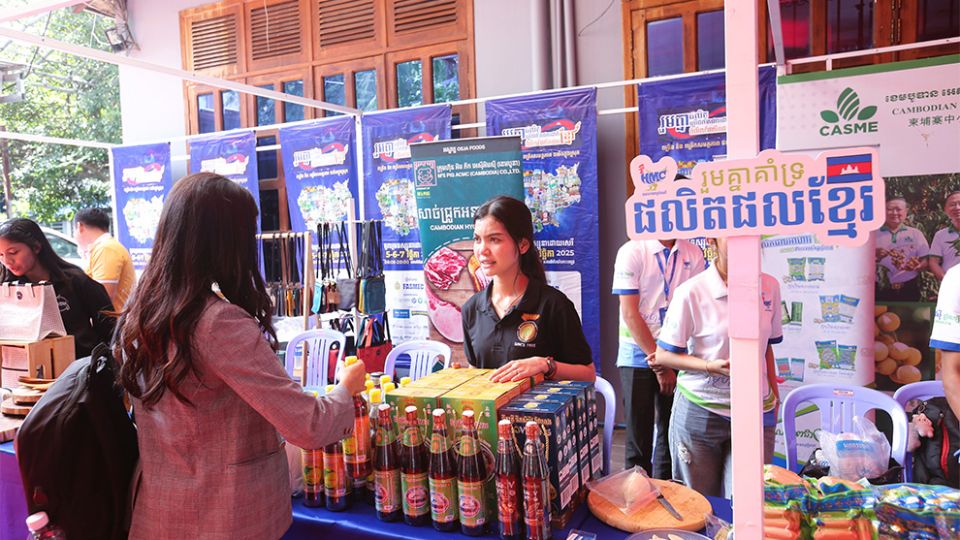November 3, 2025
PHNOM PENH – Cambodian small and medium-sized enterprises (SMEs) are doubling down on efforts to boost the production of locally produced goods, following rising public support spurred by recent border tensions with Thailand.
A surge in the promotion of national products began after the border clashes of late July, when Cambodia imposed import bans of essential goods such as vegetables, fruit and certain fuel products.
The crisis highlighted Cambodia’s heavy reliance on imports — a wake-up call that transformed frustration into solidarity.
Recognising the surge in solidarity and support for national products, business associations and relevant government institutions have intensified efforts to promote local goods through exhibitions and product showcases.
In early September, one such exhibition drew overwhelming public support.
“Cambodian people seem to have woken up. They did not expect the Thai side to underestimate Cambodia,” said Te Taing Por, chairman of the Federation of Associations of Small and Medium Enterprises of Cambodia (FASMEC), during an October 31 press conference.

Puy Kea, president of the Club of Cambodian Journalists (CCJ) and Te Taing Por, chairman of the Federation of Associations of Small and Medium Enterprises of Cambodia (FASMEC), address an October 31 press conference. PHOTO: THE PHNOM PENH POST
“They thought that when they turned off the electricity, gas, internet and food imports, the Cambodian people would be miserable. But they were wrong, although the Cambodian people had to work hard,” he added.
That renewed sense of unity was reflected in the September national product fair, where more than 100,000 attendees came to support domestic goods.
Building on that momentum, the “Joint Production, Joint Use of National Products” exhibition will be held from November 3 to 5, at the Koh Pich Exhibition Center.
The event will showcase nearly 200 locally made products at around 270 stalls, coinciding with the Water Festival holidays.
“We did not expect the reaction to the first fair in September to be so explosive,” Taing Por recalled.
“People boycotting goods from the neighbouring country came in droves to support local products,” he added.

Puy Kea, president of the Club of Cambodian Journalists (CCJ) and Te Taing Por, chairman of the Federation of Associations of Small and Medium Enterprises of Cambodia (FASMEC), address an October 31 press conference. PHOTO: THE PHNOM PENH POST
Yet challenges remain. Despite growing enthusiasm, local products still face obstacles, including limited market entry and higher production costs.
“Local products from SMEs have not yet entered the market sufficiently — we can’t just rely on fairs,” he said.
Electricity costs, small-scale operations and higher pricing continue to limit competitiveness against cheaper imports.
Taing Por urged business owners to focus not only on supplying the domestic market but also on building capacity for exports.
“As manufacturers, we must strive to produce good products according to international standards, not take advantage of opportunities to make excessive profits,” he said, adding that national pride should guide producers to help consumers boycott foreign goods without compromising on price or quality.
He also raised the need for government support, including tax exemptions for informal SMEs — currently estimated at over 700,000 across agriculture, services, trade, and tourism sectors — far beyond the 50,000 officially registered enterprises.
“There are many Khmer products that can replace imports, but we still have a long way to go,” he admitted, adding “Efforts must continue”.
Local entrepreneurs echoed the call for tougher inspection of imported goods.
Pol Kea, owner of a local company, warned that low-quality foreign goods still flood the market at low prices, undermining local products and posing health risks.
“This could damage the local market and affect the health of consumers,” he said, urging authorities to improve customs procedures and strengthen standards.
Despite the campaign, organisers stressed they are not seeking an import ban.
“We are not encouraging the government to ban foreign goods,” Taing Por clarified.
“But we are calling for a permanent shift in consumer behaviour — to choose local products first,” he continued.
As Cambodia prepares for the Water Festival, many citizens are expected to discover a wider range of products made by Cambodian hands — fuelling not just national pride, but long-term economic resilience.


